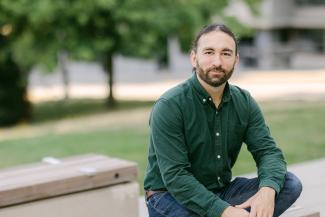
Scott Franks is a citizen of the Manitoba Métis Federation and an expert on Canadian Aboriginal law and Indigenous legal theory and practice. We’re thrilled to welcome him to the Peter A. Allard School of Law as an assistant professor.
As part of his doctoral research at the University of Ottawa, Professor Franks is currently investigating the judicial construction of Métis legal identity in the Métis settlements in Alberta. During his LLM research at Osgoode Hall Law School, he explored the barriers and opportunities to implementing the Truth and Reconciliation Commission’s Calls to Action in law schools. Before joining us at Allard Law, Professor Franks was an assistant professor at the Lincoln Alexander School of Law at Toronto Metropolitan University.
This fall, Professor Franks is teaching Indigenous Settler Legal Relations and the upper-year seminar Aboriginal & Treaty Rights. Here, he shares more about his research and why he’s excited to be here at Allard Law.
Tell us about your research. What are you currently working on?
My areas of research are Indigenous legal orders and Aboriginal law, though each of these touches on many other areas. Generally, my research focuses on the relationship between Indigenous peoples and the Canadian state. One line of research relates to anti-Indigenous prejudice in Canadian criminal jury trials. I was devastated by the intense anti-Indigenous racism circulating in my home province of Saskatchewan during Gerald Stanely's trial for his killing of Colten Boushie, a young man from Red Pheasant First Nation. This case was my main motivation for investigating anti-Indigenous prejudice in jury trials.
Another line of research focuses on the legal histories of the modern period of Aboriginal law jurisprudence. I’m currently completing my doctorate at the University of Ottawa, and my doctoral research is a legal history of Cunningham v Alberta, a case which raises interesting facets to issues related to Indigenous self-determination and governance, and membership boundaries.
A common thread in all of my research is that I understand all actors involved in the legal process as agents and as people with complex and nuanced relationships. I'm interested in their choices, motivations and normative evaluations and commitments.
What do you hope students take away from your courses this fall: Indigenous Settler Legal Relations and the upper-year seminar Aboriginal & Treaty Rights?
Speaking from past experience, I use mandatory first-year courses on Aboriginal law to bring students up to speed on the social, political and legal context related to the practice of Aboriginal and Indigenous law. Throughout, I encourage my students to understand themselves as agents in society and to develop an awareness, understanding and refinement of their normative commitments.
My upper-year seminars tend to have a more explicitly critical edge towards Canadian law. This year, my goal is to take students through three Supreme Court of Canada cases on Aboriginal rights and title, from the event that started the case, through trial, first appeal, to the arguments heard by the Supreme Court of Canada. The goal in this seminar is to highlight the choices made by individuals, communities, counsel and judges – to motivate students to reflect on how they may also make similar or different choices when practicing – and to expose students to a longer arc in the development of the jurisprudence around section 35, which is the section of Canada’s Constitution that recognizes and affirms Aboriginal rights..
How would you describe your approach to teaching?
I use a few different approaches. Generally, I aim to create materials and presentations that are equitable, accessible, and flexible to use.
In my larger lectures, I’ll use a mixture of lecturing with dialogue. When I engage with students in a dialogue, I make sure that they know that there's no pressure to respond. I genuinely treat dialogue as an opportunity to explore and examine the things that students are picking up on – that they are connecting from their own prior understanding or reading of the materials.
In my seminars, this dialogue becomes the main approach, and I use a modified version of a talking circle. We go around a circle once, where everyone gets a chance to speak, before we move to an open conversation. I'm motivated by a few core values: empathy for the learning experience, humility and respect for how we each interpret and understand each other, and analytic rigour so that we can be accurate and precise in what we are trying to communicate to others.
What are you looking forward to most about being part of the Allard community?
I'm most looking forward to the opportunities for research collaboration with faculty and for engaging in learning with students. Allard has an exceptional Indigenous law faculty and I'm very grateful to be able to join them.
Many of my friends and colleagues from the Program of Legal Studies for Native People at the University of Saskatchewan graduated from Allard and spoke highly of the faculty in the Indigenous Legal Studies group. In the short term, I’m spending some time learning about the history of these territories in the lower mainland, those of the Musqueam and Squamish Nations.


